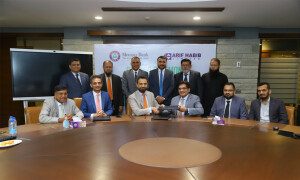COP21 Conference in December: Paris Climate Change Conference sets stage for Pakistan
The two-day forum "Pakistan Sey Paris: on the road to 2015 Paris Climate Conference" concluded here on Wednesday, which set the stage for Pakistan's preparation to the upcoming COP21 Climate Change Conference being held in Paris (France) in December this year.
The Lahore forum was jointly organised by the Embassy of France, Federal and Provincial governments, the United Nations, WWF-Pakistan and large number of civil society organisations. The forum, at Alhamra, Lahore, gathered more than 600 people from government, academia, civil society, students, private sector, media and the general public.
Eminent speakers during the two-day deliberations included French Ambassador Martine Dorance, EU Ambassador Jean-François Cautain, United Nations Resident Coordinator Neil Buhne, Member of National Assembly and Chairman of the Standing Committee on Sustainable Development Goals, Marriyum Aurangzeb; Secretary of the Ministry of Climate Change, Arif Ahmad Khan; representative of the Ministry of Foreign Affairs, Mrs Tasneem Aslam and prominent voices from civil society such as Javed Jabbar, Dr Shoaib Sultan Khan, Dr Ishrat Hussain and Dr Parvez Hassan.
In four round tables, experts discussed low-carbon development strategies in Pakistan, adaptation and impacts of climate change on food and water security, on health and gender, disaster risk management and climate smart solutions. The lead author of the National Climate Change Policy, Dr Qamar-uz-Zaman Chaudhry said "Climate Change is the 21st century's most difficult challenge humans have ever created."
Senator Javed Jabbar (Retd) advocated strengthening the capacity of civil society and decreasing their dependency on donor organisations; re-conceptualising the development approaches and adopting a collaborative rather than confrontational approach to address climate change.
Senator Nisar A Memon, Chairman Water and Environment Forum Pakistan, former Federal Minister underlined that "small solutions had to be developed together with the private sector to face climate change challenges." Former ambassador Shafqat Kakakhel stressed the need to "strengthen institutional mechanisms to promote collaboration among government agencies and non-state stakeholders for formulation and implementation of a low carbon climate resilient growth paradigm". Mrs Bella Evidente, UN Habitat, called "the cities to act and identify their risks."
Talking about the impacts of health, Dr Sania Nishtar proposed establishing cross cutting institutions that can do long term thinking and planning that see beyond the short term. Dr Dominique Reynaud, eminent French scientist, proposed establishing a scientific RPCC (regional panel on climate change) or a PPCC (Pakistan panel on climate change) on the model of the IPCC.
Dr Shoaib Sultan defended people centric development initiatives, focused on community empowerment and economic resilience in ways that reflect their hopes and aspirations. Marc-André Franche, UNDP, strongly highlighted the importance of developing climate change literacy and of implementing effectively the policies, through better governance. Youth voices were represented by the Youth Parliament. Many 'made in Pakistan', local solutions to tackle climate change were presented and new ones recommended. This 'agenda of solutions' will be showcased in Paris, highlighting Pakistani voices, challenges and people's priorities.
On the opening day, French Ambassador to Pakistan Mrs Martine Dorance in her address throwing light on COP21 being held in Paris said "the purpose of holding climate conference in Lahore is to identify the problems and solutions that all the stakeholders could promote at the Paris conference." She said Lahore conference was a kind of precursor to COP21 or a mini21.
She said Paris conference was very significant for Pakistan, which was one of the most vulnerable to climate change. She said that COP21 would be a crucial conference as it aspires to achieve a new universal agreement on climate, applicable to all countries, with the aim of keeping global warming below 2 degree Celsius. French Ambassador further said that one of the keys of the conference in Paris would be involvement of non-governmental actors, the various civil society and private sector actors of each of the members' state of the UN. The coming together of these players was part of the "Lima-Paris Action Agenda" under which many initiatives are currently being developed around the world to launch a transition toward low-carbon and green economies.

























Comments
Comments are closed.